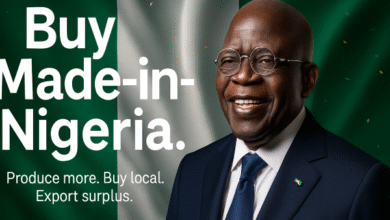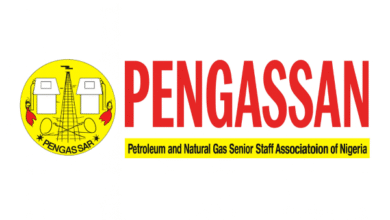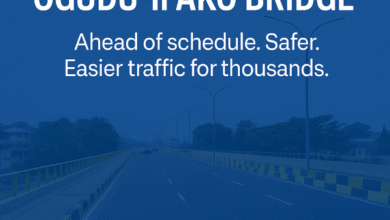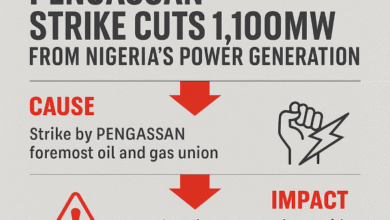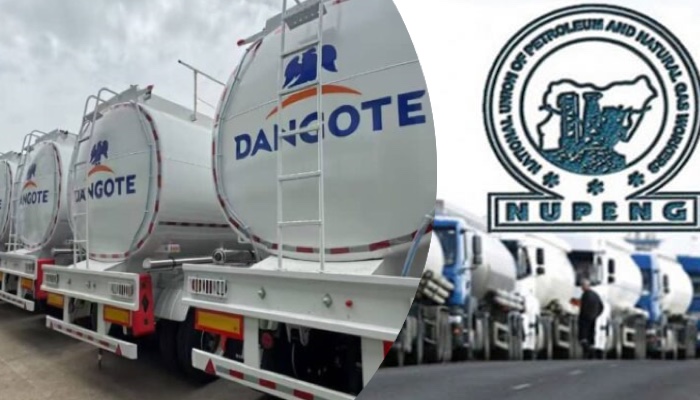
Abuja/Lagos — A marathon tripartite conciliation convened by the Federal Ministry of Labour and Employment in Abuja ended without agreement, prolonging the indefinite strike declared by the Nigeria Union of Petroleum and Natural Gas Workers (NUPENG) over alleged anti-union practices at the Dangote Petroleum Refinery. The meeting, presided over by Minister Alhaji Maigari Dingyadi, ran late into the night and broke up after Dangote’s representatives reportedly walked out, according to labour leaders on site.
Speaking after the talks, Dingyadi acknowledged a stalemate, appealed for calm, and said negotiations would continue. Benson Upah, Acting General Secretary of the Nigeria Labour Congress (NLC), alleged the Dangote side “sabotaged the process” by exiting the room. NUPENG President Williams Akporeha maintained that the dispute centres on workers’ right to unionise, accusing the refinery of seeking to bar drivers recruited for its CNG truck fleet from joining industry unions—an action unions say breaches Section 40 of Nigeria’s Constitution, the Labour Act, and ILO Conventions 87 & 98.
With no deal on the table, the strike front widened. PENGASSAN, NOGASA, NARTO, and PETROAN announced solidarity actions, while the Port Harcourt Zone of PENGASSAN ordered an indefinite shutdown at one service contractor from 12:00 a.m., Sept. 9, 2025 over unresolved CBA issues. On the ground, Delta and Sokoto reported station closures and transport disruptions as state councils enforced the stoppage; marketers in parts of Delta received notices threatening ₦1m fines for operating during the action.
The Dangote delegation did not brief the press after the meeting. Earlier in the day, management had proposed allowing some categories of staff to unionise; NUPENG insisted all employees must have the right to register with recognised industry unions. The unions also warned that large-scale deployment of Dangote’s in-house CNG truck fleet could displace existing transporters, deepen market concentration, and weaken independent players in the distribution chain.
Why It Matters (Downstream Impact)
- Supply security: A sustained PTD loading halt risks queues, rationing and markup spikes—especially across Lagos, Abuja, Port Harcourt and inland depots.
- Inflation channel: Logistics stoppages feed directly into PMS/AGO pump prices, urban transport fares, and food distribution costs.
- Competition policy: The row tests Nigeria’s stance on monopoly risk and third-party access in downstream logistics as mega-assets scale.
- Labour governance: How authorities adjudicate union rights vs. operational control will set precedents for other energy projects.
By the Numbers (from parties’ statements)
- Status: No MoU; talks adjourned after late-night stalemate in Abuja.
- Scope: NUPENG national action; PENGASSAN, NOGASA, NARTO, PETROAN signal/commence solidarity.
- PH Zone directive: 00:00, Sept. 9, 2025—strike at Cameron/OneSubsea Offshore Systems Nigeria Ltd (per zonal circular).
- Local effects: Station closures and fare spikes reported in Delta and Sokoto.
Important: Allegations stated above are the positions of the parties; regulators have not issued a final determination.
Legal & Policy Lens
- Section 40 (Constitution): Freedom of association & unionisation.
- Labour Act: Collective bargaining, dispute procedures.
- ILO 87 & 98: Freedom of association & right to organise/bargain.
- NMDPRA/NPC roles: Oversight of market continuity, essential-service protocols, and depot operations during disputes.
- Competition/market access: Ensuring pipeline/trucking non-discriminatory access to prevent foreclosure of independents.
Stakeholder Map
- NUPENG (Williams Akporeha): Seeks full unionisation rights; opposes perceived monopolistic logistics.
- PENGASSAN (Lumumba Okugbawa): Backs full union access; threatens escalation if impasse persists.
- NLC (Joe Ajaero) & TUC: Solidarity; call for compliance with labour laws.
- NOGASA (Benneth Korie), NARTO (Yusuf Othman), PETROAN (Billy Gillis-Harry): Warn of disintermediation of suppliers/transporters; threaten service withdrawal.
- Dangote Refinery (rep: Sayyu Dantata referenced): Sought limited union scope (per union account); left meeting without media comments.
- FG (MinLabour: Dingyadi): Convenor; pressing for truce and MoU.
Scrutinising the Allegations (Expert View)
- Union ban claim: If recruitment contracts condition employment on non-membership of industry unions, that collides with Section 40/ILO norms. Any “company union” only clause will draw regulatory heat.
- Union Over-reach: NUPENG has been accused of excessive levying, extortion and even economic sabotage by a section of workers. Government needs to investigate and, if confirmed, take action to end it.
- Monopoly/foreclosure risk: A vertically integrated fleet serving end-users directly (telcos, hotels, construction) can compress margins for independent suppliers/hauliers. Nigerian law doesn’t ban vertical models, but discriminatory access and predatory pricing would trigger competition scrutiny.
- Market displacement: Rapid onboarding of a large captive fleet risks redundancy for third-party drivers if access rules and tariffs aren’t transparent. A common-carrier framework or open logistics slots could mitigate this.
Effects on the Economy (Near-Term Nowcast)
- Fuel queues: If depot loading remains constrained 48–72 hours, expect urban queues, route prioritisation, and secondary market premiums.
- Transport inflation: Keke/bus fares rise first; parcel/haulage tariffs follow within days.
- SME stress: Cold-chain, hospitality, construction and MSME generators face cost spikes and stock-outs.
- FX & sentiment: Prolonged disruption dents investor confidence in downstream reforms unless authorities move fast on a verifiable truce.
Scenario Outlook (Next 72 Hours)
- Conditional stand-down: Written interim MoU—access for organisers to workers, no victimisation, phased union elections; depots reopen.
- Patchy resumption: Some depots load under state pressure; regional scarcity persists; prices volatile.
- Standoff: Broad stoppage; NMDPRA activates minimum-service directives; risks of enforcement flashpoints at depots/retail.
BRANDECONOMY Take
Nigeria must protect workers’ rights while keeping energy logistics flowing. The excesses of unions also need to be scrutinized and checked. The only durable path is a time-bound, auditable MoU that covers (a) full freedom of association, (b) no retaliation for union activity, (c) transparent logistics access to prevent foreclosure, and (d) a regulator-monitored de-escalation of the strike.
Execution playbook (immediate):
- Day 0–1: Name an independent conciliator, fix a 48-hour timetable, and publish term-sheet bullets.
- Day 1–2: Agree observer access for unions to conduct membership drives onsite; commit to secret-ballot certification windows.
- Day 2–3: Set interim logistics rules (non-discriminatory loading windows, fair trucking tariffs) pending full competition review.
- Monitor: A joint Ops Room (Labour + NMDPRA + Parties) with hourly depot status and incident hotlines to keep the system wet.
Bottom line: Resolve the rights question and market-access guardrails together—or this crisis will recycle. The refinery is strategic; so are the unions and independents that make the downstream network work.
FAQ
What caused the deadlock?
Disagreement over scope of unionisation at Dangote Refinery and a reported walkout by company representatives, per labour leaders.
Who’s on strike now?
NUPENG nationwide; PENGASSAN, NOGASA, NARTO, PETROAN have announced/support solidarity actions in varying degrees.
Where is impact visible?
Early reports of closures/transport stress in Delta and Sokoto; risk of wider queues if loading halts continue.
What ends it quickly?
A written, verifiable MoU guaranteeing union rights and non-discriminatory logistics access, with regulator oversight and a phased suspension of industrial action.






